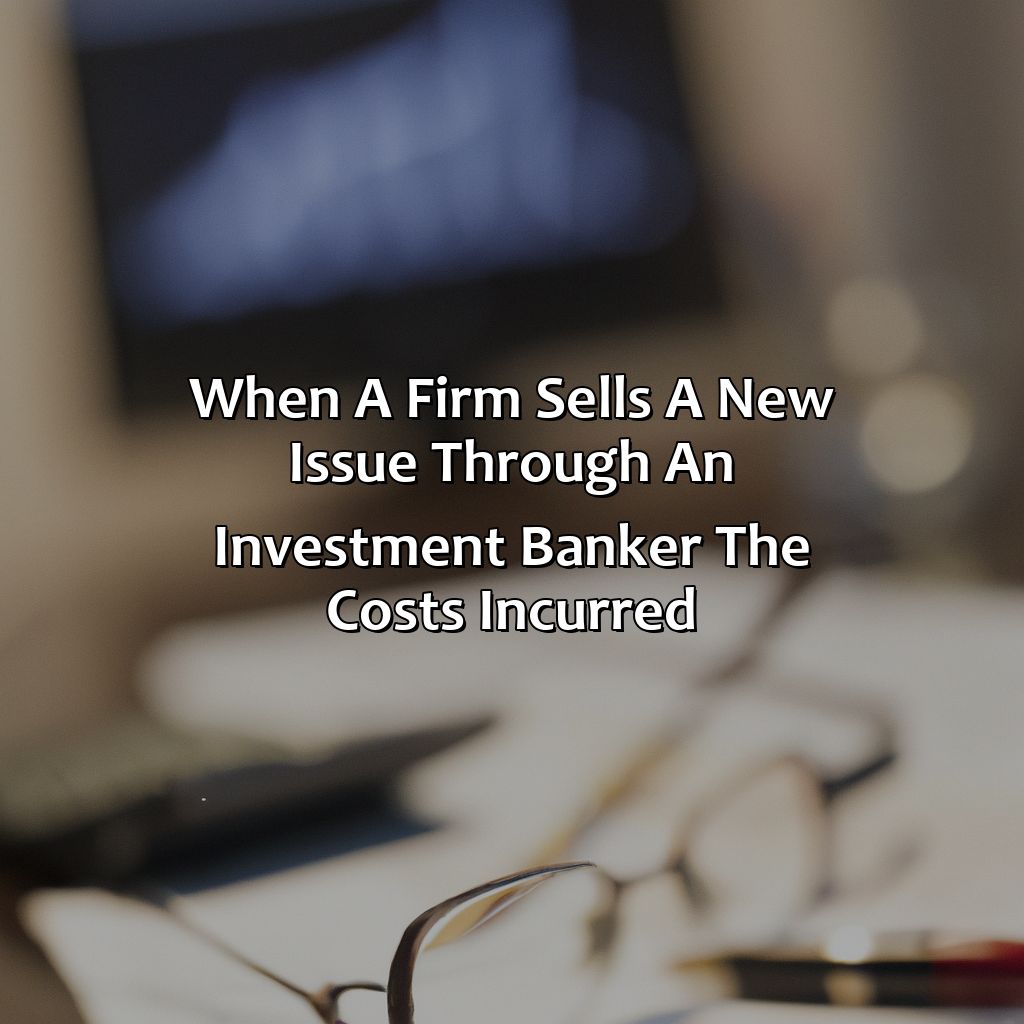When A Firm Sells A New Issue Through An Investment Banker, The Costs Incurred?
Key Takeaway:
- A new issue is when a company offers securities to the public for the first time, such as stocks or bonds, in order to raise capital for business operations.
- Investment bankers play a crucial role in selling new issues by underwriting the securities and finding buyers, often taking on financial liability for unsold securities.
- The costs incurred in selling new issues generally include underwriting fees, legal fees, and marketing and distribution expenses, which are reflected in the pricing of the securities and can impact investor demand.
Are you curious about the expenses associated with a firm when it sells a new issue through an investment banker? In this blog, we will discuss the various costs involved in the process and how it impacts the overall cost. You’ll learn how to identify and manage these costs to ensure a successful outcome.
What is a new issue?
A new issue refers to the first time a company publicly offers and sells its shares or securities to the public through an investment banker. It is a way for the company to raise capital for various business operations or expansion. The investment banker facilitates the sale of securities by underwriting the shares, marketing them to potential investors, and bearing the risk of any unsold shares. Typically, a new issue is made by companies that are already publicly traded or those that aim to go public.
When a firm sells a new issue through an investment banker, it incurs costs such as underwriting fees, commissions, legal costs, and printing fees for producing prospectus materials. Underwriting fees are the cost of taking on the risk of selling the shares, while commissions are the fees paid to brokers who sell the shares to individual investors. Legal fees are incurred for drafting the legal documents required for the sale of the shares, and printing fees are for producing prospectus materials such as the roadshow presentation and the prospectus itself.
Besides these costs, a company may also incur opportunity costs such as dilution of existing shareholders’ ownership and potential loss of control due to newly issued shares. However, a new issue can benefit the company by raising capital and increasing its public profile.
Pro Tip: Before a company decides to issue new shares, it should evaluate the potential benefits and drawbacks of a new issue, including the costs and risks involved.

Image credits: retiregenz.com by David Washington
The role of investment bankers in selling new issues
The vital role of investment bankers in the process of issuing new securities is undeniable. Investment bankers assist firms in raising capital by offering new securities to the public and assisting them throughout the process. They also provide valuable advice on pricing, timing, and structuring the offering to maximize the value of the securities. By leveraging their networks and expertise, they help companies reach a wider audience of potential investors, ensuring a successful launch of the securities.
Investment bankers have many responsibilities when selling new securities, such as:
- assessing the market conditions
- developing an optimal pricing strategy
- identifying potential investors
- managing the distribution of the securities
They are also responsible for creating marketing materials and presentations that convince investors to buy the security. In addition, investment bankers play a critical role in the due diligence process, ensuring that companies adhere to regulatory requirements and that the securities offering is legally compliant. They help navigate complex legal and accounting issues that can arise during the process.
By engaging investment bankers, firms can raise more capital than they would on their own. Furthermore, investment bankers can help firms manage risks associated with the securities offering, reducing their financial risk exposure. Overall, investment bankers are instrumental in aiding firms to issue new securities successfully.
To maximize your firm’s potential and reach a broader audience of potential investors, don’t hesitate to consult with a reputable investment banker. Failure to do so could risk leaving capital on the table and missing out on growth opportunities. Invest in your company’s future by leveraging the assistance of qualified investment bankers.

Image credits: retiregenz.com by Harry Arnold
Types of costs incurred in selling new issues
To comprehend the various costs linked with selling new investments through investment bankers, we must break it down into three parts. These consist of:
- Underwriting fees,
- Legal fees, and
- Marketing/distribution expenditures.
Each of these influences the overall cost of the investment. Knowing them can help you make wiser decisions as an investor.

Image credits: retiregenz.com by David Duncun
Underwriting fees
New Issue Underwriters Cost Breakdown
When a company offers securities to the public, it incurs significant costs in the form of underwriting fees. These fees vary based on various factors, such as the number of shares offered, the complexity of the offering, and market conditions. Underwriting fees may include:
- A base commission for distributing securities
- An additional fee for selling larger quantities of shares
- Expenses related to due diligence
Underwriters are also entitled to a structuring fee in certain circumstances; this payment is designed to compensate banks for their efforts in creating complex securities offerings. Other costs related to new issue sales may include legal fees, printing expenses, travel costs associated with roadshows or presentations, and other administrative overhead.
When Google went public through an initial public offering (IPO) on August 19th 2004, it attracted legions of investors clamoring for coveted IPO shares. In addition to paying three investment banks $100 million in total underwriter’s commissions and expenses, Google spent another $1 billion on advertising after the company decided to upsize its IPO from 14.1 million to 19.6 million shares because of exceptional demand. The event raised $1.9 billion at its debut price of $85 per share – proving once again that strong markets can be extremely lucrative for issuers and their bankers alike.
Legal fees: the necessary evil of selling new issues – it’s like paying for a lawyer to be your wingman at a bar, except the drinks cost way more.
Legal fees
The expenses incurred when a company sells new shares through an investment banker include legal costs, which are the charges for legal services provided during the offering process. The legal fees vary based on the complexity of the offering structure, regulatory compliance requirements, and other factors. Lawyers help create disclosures for prospectus or offering memorandum, review contracts, and ensure that all necessary permits and licenses are obtained.
It is common for companies planning to go public to engage a law firm specializing in securities with qualified attorneys licensed in the state where they intend to offer securities. Legal fees may also cover any litigation that may arise from disputes related to the sale of securities.
In addition to assisting with regulatory compliance and performing due diligence checks, lawyers can also provide valuable advice regarding potential risks associated with going public. Their insights into how regulations affect public companies may help executives make more informed decisions about their investments.
A case in point is Uber’s settlement of a class-action lawsuit filed by drivers who claimed they were misclassified as contractors instead of employees, which resulted in a payment of $100 million in compensation and benefits. Lawyers played a crucial role in negotiating terms that would mitigate any financial damage caused by the negative publicity surrounding this lawsuit. This underscores how important it is for firms considering going public or issuing new shares to factor in anticipated legal expenses into their budget forecasts.
Marketing and distribution expenses? More like ‘Money spent to convince people to buy our stuff, even if they didn’t know they wanted it’.
Marketing and distribution expenses
In selling new issues, a firm incurs various costs related to marketing and distribution. These expenses include fees paid to underwriters, legal and accounting charges, printing and mailing costs, as well as promotional activities aimed at capturing investors’ attention and raising awareness about the new issue.
Moreover, investment bankers involved in the process may also incur expenses such as travel costs for roadshows or organizing investor conferences. These efforts are crucial for successful IPOs (Initial Public Offerings) or other types of securities offerings on the stock market.
It is important for firms to carefully weigh the costs of these initiatives against potential benefits, such as increased liquidity and exposure to new investors. In doing so, they can optimize their chances of success in the new issue market.
According to a report by McKinsey & Company, between 2015 and 2020, investment banks earned approximately $60 billion globally from equity capital markets fees alone.
Brace yourselves, folks, we’re about to dive into the thrilling world of pricing new issues and the exciting costs that come along with it.
How costs impact the pricing of new issues
New issue pricing is impacted by the various costs incurred by a firm when selling through an investment banker. These costs can include underwriting fees, legal fees, administrative expenses, and marketing costs. To understand the impact of costs on new issue pricing, it is important to analyze each cost individually and its contribution to the overall expense.
The table below provides a breakdown of the various costs incurred by a firm during a new issue offering, along with their average percentages of underwriting fees. This can assist in understanding the relationship between the costs and the pricing of new issues.
| Cost | Percentage of Underwriting Fees |
|---|---|
| Underwriting fees | 2-4% |
| Legal fees | 1% |
| Administrative expenses | 0.5-1% |
| Marketing costs | 1-1.5% |
While the underwriting fees are the primary cost associated with a new issue, legal fees, administrative expenses, and marketing costs also contribute to the overall expense. Any increase or decrease in these costs can impact the pricing of the new issue. Therefore, careful consideration of the expenses is necessary to correctly price the new issue.
It is important to note that the cost analysis should not be the only factor while pricing a new issue. Market conditions, demand, and various other factors should be considered in determining the optimal price. Failing to take these aspects into account can result in losing potential investors and potential profits.
Investors should also consider the impact of costs on pricing while making investment decisions. Knowing the various expenses associated with a new issue offering can provide insight into the overall expenses of the firm and its financial stability. This information can be useful in the decision-making process, especially when considering the risk and reward ratio.

Image credits: retiregenz.com by Harry Washington
Some Facts About When a Firm Sells a New Issue Through an Investment Banker, the Costs Incurred:
Investment bankers charge fees for their services, including underwriting, due diligence, and marketing of the new issue. (Source: Corporate Finance Institute)
The underwriting fee is typically 7% of the total value of the new issue. (Source: Investopedia)
Legal and accounting fees are also incurred during the new issue process. (Source: The Balance)
The cost of issuing and distributing the new shares, including printing and mailing expenses, can add up significantly. (Source: NYU Stern School of Business)
Despite the costs, firms often choose to sell new issues through investment bankers to gain access to a wider pool of investors and raise capital quickly. (Source: Forbes)
FAQs about When A Firm Sells A New Issue Through An Investment Banker, The Costs Incurred?
What costs are incurred when a firm sells a new issue through an investment banker?
When a firm sells a new issue through an investment banker, there are various costs involved such as underwriting fees, legal and accounting fees, printing and distribution costs, and marketing expenses. The investment banker charges the underwriting fees, which are typically around 7% of the total amount raised, to compensate for the risks and services provided.
Are there any other fees to be paid to investment bankers?
Yes, there are additional fees that a firm may have to pay to investment bankers, such as expenses related to due diligence, roadshows, and regulatory filings. These fees can add up to a significant amount, so it is important for firms to negotiate with investment bankers to manage costs.
How do firms choose investment bankers for new issues?
Firms typically choose investment bankers based on their expertise, reputation, and track record in the industry. They also consider the investment banker’s connections with potential investors, pricing strategies, and willingness to work with the firm’s needs and limitations.
Can firms sell new issues without the help of an investment banker?
While it is possible for firms to sell new issues without the help of an investment banker, it is a risky and challenging process. Investment bankers have extensive experience, resources, and networks that can help firms navigate the complex process of issuing new securities and finding investors.
What are the advantages of selling new issues through investment bankers?
The advantages of selling new issues through investment bankers include access to a wider network of potential investors, underwriting services, pricing strategies, and expertise in navigating regulatory requirements. Investment bankers also help firms with due diligence, market analysis, and structuring the offering to appeal to investors.
What are the risks of selling new issues through investment bankers?
The risks of selling new issues through investment bankers include the possibility of high fees, conflicts of interest, and reputational damage if the offering fails or is not well-received by investors. There is also the risk of diluting the value of existing shares if the new issue is oversubscribed or the price is set too low.
 Checkout this IRS Loophole
Checkout this IRS Loophole 
